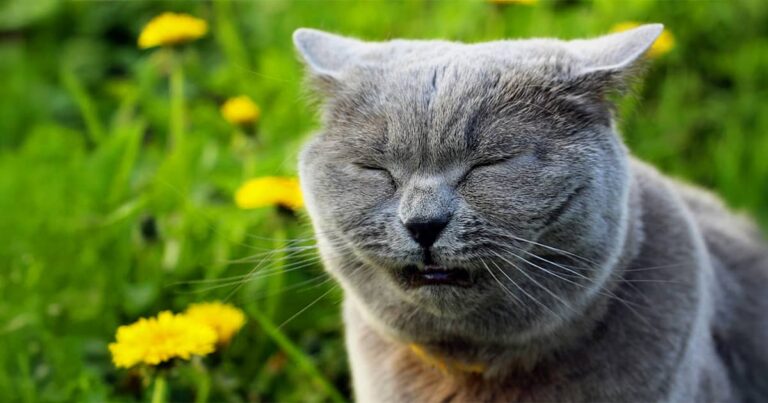Losing weight is tough whether you have two legs or four. But it can be especially challenging to get an overweight or obese indoor cat to drop a pound or two. If you’ve put your tubby tabby on a diet but the scale’s readout hasn’t changed, then it’s time to take a close look at what you are — and, more importantly, are not — doing to achieve success.
Switching cat foods usually isn’t enough
Changing your cat’s food to a “light” or weight management formula without modifying other aspects of your cat’s care often fails to produce successful weight loss. The key to successful weight loss is a comprehensive program that controls calories from all sources, increases activity (aka exercise), and reduces or eliminates behaviors that contribute to obesity.
Weight control cat foods, even those labeled as “light,” “lite” or “low calorie,” can vary greatly in calorie content. Compared to adult maintenance diets, some weight management cat foods may not really be low in calories. So if you’re not measuring how much food you’re putting in kitty’s bowl, now’s the time to start because cats can gain weight on weight control food if they eat too much of it. A recent study found measuring cups were not a precise way to measure dry dog foods, and veterinary nutritionists suspect the same is true for dry cat foods. If you have a food scale at home that allows you to weigh food in grams, that may be a more accurate option for measuring your cat’s food.
You may also need to reduce the number of food treats and eliminate all table foods from your cat’s diet. If your cat gets medication hidden in a food treat, those calories need to be counted as part of your cat’s daily calorie allowance.
Try keeping a food journal for your cat to track what your kitty is being given to eat. It may help identify potential sources of extra calories.
RELATED POST: Five Tips for Starting Your Cat on a Weight Loss Program
Team effort is essential for success
If your cat isn’t losing weight as a result of what you’ve been doing at home, then it’s time to join forces with your cat’s veterinary care team. Yes, taking your cat to the veterinary clinic takes time and money — and may cause a bit of stress — but think of the appointment as an investment in your cat’s health.
When you partner with your veterinarian to help your cat lose weight, you can expect your veterinarian to:
- Determine your cat’s ideal weight and, if necessary, identify intermediate weight goals if your cat is particularly chubby
- Determine the appropriate number of calories needed to lose weight
- Recommend an appropriate over-the-counter or therapeutic weight loss food that can help your cat lose fat and preserve muscle
- Tell you exactly how much to feed and when
- Provide ideas for how to get your cat moving more
- Test your feline friend for any health issues that might interfere with weight loss
- Uncover any medical concerns that could limit your cat’s ability to move more, such as arthritis, and provide treatment recommendations
- Provide follow-up support and accountability
Commit to regular weight checks
Regular monitoring of your cat’s weight is as important to successful weight loss as the right food and activity. Recheck appointments or “weigh-ins” allow the veterinary care team to adjust your cat’s weight management plan to ensure your kitty is losing 0.5 to 1 percent of body weight per week (or about 0.08 to 0.15 pounds for a 15-pound cat). Weigh-ins also give you an opportunity to see the results of your efforts — or the consequences of inadvertently (or deliberately) feeding extra calories or skipping activity sessions.
Weight recheck appointments are typically scheduled for every two weeks initially. If weight loss is proceeding at a rate of 0.5 to 1 percent per week, weigh-ins can then occur monthly.
If your cat is stressed by a trip to the veterinary clinic, consider buying a baby scale so you can weigh your cat at home and call in weight updates. A baby scale is more sensitive than other types of human scales and should detect small changes in your cat’s weight.
What if there’s still no progress?
Don’t give up! If you’ve faithfully followed your veterinarian’s recommendations for a month or longer and haven’t seen any change in your kitty’s weight, it’s time to look further for a reason. Are other people in your home feeding the cat too? Are there young children who drop food on the floor for your cat to snack on? Could your cat be pregnant? Could there be an underlying health issue? Be sure to talk to your veterinarian about having blood tests run — if they haven’t been done recently — to detect potential medical issues that could be keeping your cat from losing weight.
Above all, be patient with your kitty and yourself. Weight gain doesn’t happen overnight and neither will its loss. And like people, cats can hit a plateau during their weight loss efforts as their metabolism changes in response to calorie restriction. If you continue to follow your veterinarian’s recommendations, however, your cat will eventually lose weight and live a longer, healthier life because of your care.
RELATED POST: It’s Complicated: People, Pets and Food








